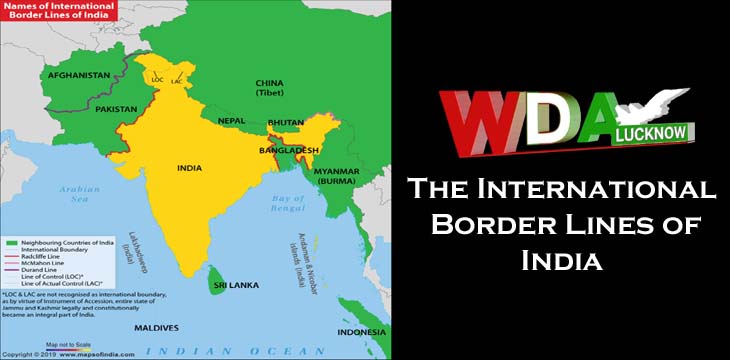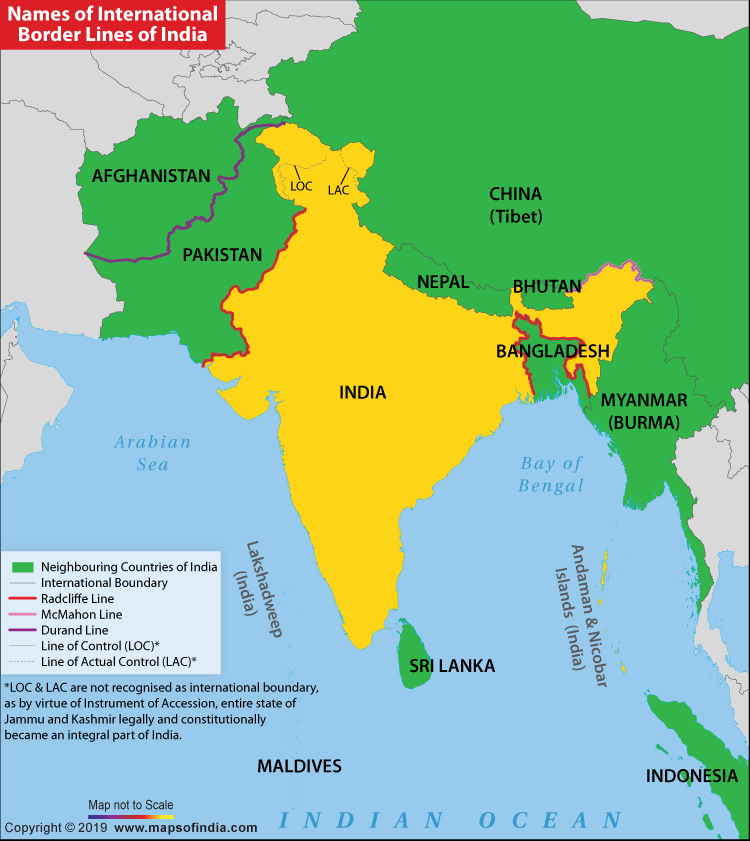The International Border Lines of India | Best Defence Coaching in India
The International Border Lines of India | Best Defence Coaching in India Warriors Defence Academy is the Best Coaching for NDA/CDS/SSB/NAVY/AFCAT/AIRFORCE X GROUP or Y GROUP in Lucknow.
Warriors Defence Academy | Best NDA Coaching in Lucknow | Best Airforce Coaching in Lucknow | Best Defence Coaching in Lucknow India.
Address: 545-GA/1-CHHA, beside Madhuwan Guest house Chandganj Near Railway Crossing, Kapoorthla, Lucknow, Uttar Pradesh 226006
Phone: +91-7081011964
Website: https://warriorsdefenceacademy.com/
The International Border Lines of India: A borderline is a dividing line that marks the territorial limits between two countries. Our country India shares land borders with seven countries including Bhutan, Bangladesh, China, Afghanistan, Myanmar, Nepal, and Pakistan and maritime borders with Sri Lanka, Maldives and Indonesia. It has 15,106.7 kilometres of land border and a coastline of 7,516 kilometres including its island territories.
Given below is a list of important boundary lines, and the list of states which share their boundaries with the seven neighbouring countries.
McMahon Line – The International Border Lines of India
Named after the British Indian Army officer Lieutenant Colonel Sir Arthur Henry McMahon, who was also an administrator in British India, the McMahon line is a demarcation that separates Tibet and northeast India. Colonel McMahon had proposed this line as the boundary between Tibet, China, and India at the Shimla Convention of 1914. It was accepted by Tibetan authorities and British India and is now acknowledged by the Republic of India as the official boundary. China, however, disputes the validity of the McMahon line. It claims that Tibet isn’t a sovereign government, and therefore any treaty made with Tibet stands invalid.
Radcliffe Line – The International Border Lines of India
Radcliffe Line divided British India into India and Pakistan. It is named after the architect of this line, Sir Cyril Radcliffe, who was also the chairman of the Boundary Commissions. The Radcliffe Line was drawn between West Pakistan (now Pakistan) and India on the western side and between India and East Pakistan (now Bangladesh) on the eastern side of the subcontinent.
Durand Line – The International Border Lines of India
The Boundary line between India and Afghanistan demarcated by Sir Mortimer Durand, a British diplomat in the year 1896 is known as the Durand Line. It separated British India and Afghanistan. After the partition, Pakistan inherited this line. However, a short section of the Afghanistan border is shared with the Indian state of Jammu and Kashmir.
Line of Actual Control (LAC) – The International Border Lines of India
Line of Actual Control is the demarcation line between India and China which separates the India controlled territory from the China-controlled territory in the former princely state of Jammu and Kashmir. In 1962, the two countries were embroiled in a war. China attacked India and captured the Aksai Chin area. In 1963, China declared a ceasefire but did not leave the area. Now, the ceasefire line is known as the LAC. This line is not actually recognised as an international boundary, as by virtue of Instrument of Accession, the entire state of Jammu and Kashmir legally and constitutionally became an integral part of India.
Line of Control (LOC) – The International Border Lines of India
The military-controlled line between India and Pakistan in the former princely state of Jammu and Kashmir is named the Line of Control (LOC). It was originally known as the Ceasefire Line. After the Simla Agreement was signed on July 3, 1972, the Ceasefire Line was renamed as the LOC. This line is not actually recognised as an international boundary, as by virtue of Instrument of Accession, the entire state of Jammu and Kashmir legally and constitutionally became an integral part of India.
A quick glance at the seven land-bordering countries, and the names of states bordering them:
- India and Pakistan (3,233 kilometres)
Punjab
Rajasthan
Gujarat
Jammu and Kashmir
- India and China (3,488 kilometres)
Sikkim
Jammu and Kashmir
Uttarakhand
Arunachal Pradesh
Himachal Pradesh
- India and Nepal (1751 kilometres)
Uttar Pradesh
Uttarakhand
West Bengal
Bihar
Sikkim
- India and Bhutan (699 kilometres)
West Bengal
Sikkim
Assam
Arunachal Pradesh
- India and Myanmar (1643 kilometres)
Manipur
Arunachal Pradesh
Nagaland
Mizoram
- India and Bangladesh (4,096 kilometres)
Meghalaya
Assam
Tripura
Mizoram
West Bengal
- India and Afghanistan (106 kilometres)
Jammu and Kashmir
Maritime neighbours of India and the Indian States/Union Territories closest to them:
- India and Sri Lanka
Tamil Nadu
- India and Maldives
Lakshadweep (UT)
- India and Indonesia
Andaman and Nicobar Islands






